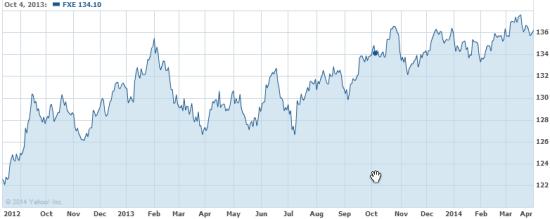Europe is an economic basket case while the US is kind-of sort-of recovering. Why? Several reasons, but the only one that really matters these days is that in 2012 and 2013 the eurozone operated with tight monetary policy and an appreciating currency while the US created new money with abandon and let the dollar fall. So US products got cheaper on global markets and US companies and consumers were able to borrow at more favorable rates. The result: relatively fast growth in the US and a descent into deflationary depression for the eurozone. Here’s the euro vs the dollar between early 2012 and early 2014:

But this is a currency war, so every couple of years the battle lines shift. Since the beginning of 2014 the foreign exchange markets have been anticipating a new round of debt monetization from the European Central Bank and a winding down of quantitative easing from the US Fed. As a result the euro has been falling versus the dollar, nearly eliminating the previous couple of years’ appreciation.

So, a prediction: The coming year will see the US disappoint the analysts who expect a return to strong growth, while the eurozone, after a serious scare later this year that prompts the ECB to open the monetary floodgates, begins to stabilize.
None of this means anything of course, since a currency war is by definition a zero-sum game where one combatant’s gain is another’s loss. But it will surprise those who focus on secondary effects like corporate profits or equity prices, while moving us one step closer to the day when competitive devaluation stops working for anyone.

